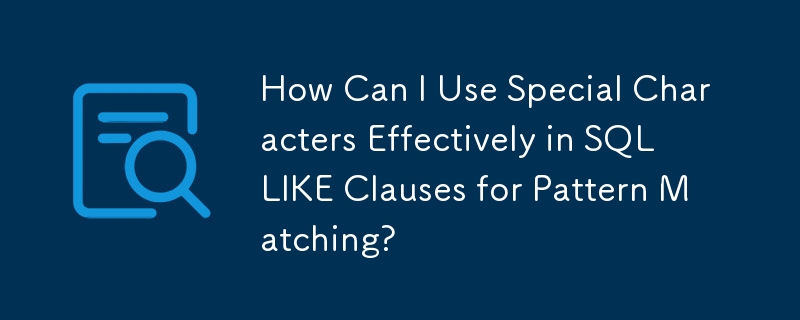 Database
Database
 Mysql Tutorial
Mysql Tutorial
 How Can I Use Special Characters Effectively in SQL LIKE Clauses for Pattern Matching?
How Can I Use Special Characters Effectively in SQL LIKE Clauses for Pattern Matching?
How Can I Use Special Characters Effectively in SQL LIKE Clauses for Pattern Matching?
Jan 07, 2025 am 07:25 AM
Comprehensive List of Special Characters for SQL LIKE Clause
In the context of SQL queries, the LIKE clause provides a powerful tool for performing pattern-based searches. To cater to a wide range of pattern matching requirements, various SQL dialects support a comprehensive set of special characters.
Common Special Characters
Across most SQL dialects, several common special characters are employed for pattern matching:
- % (Percent Sign): Represents any string of zero or more characters.
- _ (Underscore): Matches any single character.
- [] (Square Brackets): Encloses character ranges or specific characters for matching.
Database-Specific Variations
In addition to these common characters, certain databases offer additional capabilities:
SQL Server:
- **[specifier]: Matches a single character within the specified range (e.g., [a-z]).
- **[^specifier]: Matches a single character outside the specified range.
- ESCAPE clause: Allows specifying a character to escape the literal meaning of other special characters.
MySQL and Oracle:
- ESCAPE clause: Similar to SQL Server's ESCAPE clause.
PostgreSQL:
-
SIMILAR TO operator: Extends LIKE functionality with additional modifiers such as:
- []: As in SQL Server.
- |: Match either of two alternatives.
- *: Repeat the previous item zero or more times.
- : Repeat the previous item one or more times.
ANSI SQL92:**
- ESCAPE clause: Optional, if specified.
Example Usage
In SQL Server:
SELECT Name FROM Person WHERE Name LIKE '%Jon%'
finds all names containing "Jon" anywhere.
In PostgreSQL using the SIMILAR TO operator:
SELECT Name FROM Person WHERE Name SIMILAR TO 'J[ao]'
matches all names starting with either "Ja" or "Jo".
By leveraging the special characters supported by various SQL dialects, developers can construct highly flexible and efficient pattern matching queries.
The above is the detailed content of How Can I Use Special Characters Effectively in SQL LIKE Clauses for Pattern Matching?. For more information, please follow other related articles on the PHP Chinese website!

Hot Article

Hot tools Tags

Hot Article

Hot Article Tags

Notepad++7.3.1
Easy-to-use and free code editor

SublimeText3 Chinese version
Chinese version, very easy to use

Zend Studio 13.0.1
Powerful PHP integrated development environment

Dreamweaver CS6
Visual web development tools

SublimeText3 Mac version
God-level code editing software (SublimeText3)

Hot Topics
 Reduce the use of MySQL memory in Docker
Mar 04, 2025 pm 03:52 PM
Reduce the use of MySQL memory in Docker
Mar 04, 2025 pm 03:52 PM
Reduce the use of MySQL memory in Docker
 How do you alter a table in MySQL using the ALTER TABLE statement?
Mar 19, 2025 pm 03:51 PM
How do you alter a table in MySQL using the ALTER TABLE statement?
Mar 19, 2025 pm 03:51 PM
How do you alter a table in MySQL using the ALTER TABLE statement?
 How to solve the problem of mysql cannot open shared library
Mar 04, 2025 pm 04:01 PM
How to solve the problem of mysql cannot open shared library
Mar 04, 2025 pm 04:01 PM
How to solve the problem of mysql cannot open shared library
 What is SQLite? Comprehensive overview
Mar 04, 2025 pm 03:55 PM
What is SQLite? Comprehensive overview
Mar 04, 2025 pm 03:55 PM
What is SQLite? Comprehensive overview
 Run MySQl in Linux (with/without podman container with phpmyadmin)
Mar 04, 2025 pm 03:54 PM
Run MySQl in Linux (with/without podman container with phpmyadmin)
Mar 04, 2025 pm 03:54 PM
Run MySQl in Linux (with/without podman container with phpmyadmin)
 Running multiple MySQL versions on MacOS: A step-by-step guide
Mar 04, 2025 pm 03:49 PM
Running multiple MySQL versions on MacOS: A step-by-step guide
Mar 04, 2025 pm 03:49 PM
Running multiple MySQL versions on MacOS: A step-by-step guide
 What are some popular MySQL GUI tools (e.g., MySQL Workbench, phpMyAdmin)?
Mar 21, 2025 pm 06:28 PM
What are some popular MySQL GUI tools (e.g., MySQL Workbench, phpMyAdmin)?
Mar 21, 2025 pm 06:28 PM
What are some popular MySQL GUI tools (e.g., MySQL Workbench, phpMyAdmin)?
 How do I configure SSL/TLS encryption for MySQL connections?
Mar 18, 2025 pm 12:01 PM
How do I configure SSL/TLS encryption for MySQL connections?
Mar 18, 2025 pm 12:01 PM
How do I configure SSL/TLS encryption for MySQL connections?






